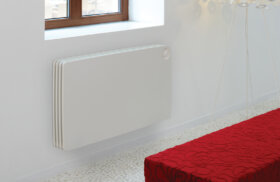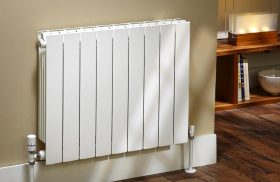Typically, central heating systems should be silent, except for an occasional little gurgling or clicking noise when it comes on.
However, if you hear your radiator whistling or making a hissing noise, there may well be something that needs fixing. Regular maintenance of your radiators is imperative to have an efficient heating system once winter arrives, but things can still go wrong.
In this blog, we discuss how to identify the cause of your noisy radiator and possible solutions you can try to restore a peaceful living environment.
Identifying the Cause of Noisy Radiators
Radiators can make various noises. It’s important to establish what kind of sound your radiators are making to choose the right solution. Here are the most common noises that radiators make and what you can do to stop them:
Banging or clanking
A banging or clunking sound coming from your heating system can indicate steam trapped in the pipes. As steam flows through the system, water is pushed forward at a rapid rate.
When the water hits an obstacle, you are able to hear it. This can be resolved by shimmying up one side of the radiator so it tips toward the boiler and the water doesn’t remain stagnant.
Hissing or squeaking
Central heating that sounds like wind blowing through a forest is usually the sound of air escaping the radiator. A hissing or whistling radiator is caused by too much air leaving your radiator and you might need to replace the air vent.
Replacement air vents can often be found at your local hardware store at an affordable price, but be sure to consult with a heating engineer before purchasing them.
Gurgling
If your radiator sounds a lot like someone gargling water, this could mean that air has accumulated and this can be solved by bleeding your radiator. Gurgling could also be caused by an irregular surface in the radiator as water flows over it. Use a radiator key to bleed your radiator and let the excess air out.
Air
Air bubbles can occur as a result of the hot water moving inside the pipes, and they will make little clicking noises. They can be dealt with fairly easily by waiting for the system to cool down so the air bubbles rise to the top, then bleeding the radiators. You may have to do this more than once to completely get rid of all the bubbles.
A greater amount of air in the system will cause a gurgling noise. Again, bleeding the radiators should sort the problem.
If there is a lot of trapped air in the central heating system, then there may be a problem with the feed and expansion (F&E) tank, which is usually in the loft. The F&E tank works in a similar way to a toilet cistern.
If the tank is dry, it is probably a result of the ball valve becoming stuck in the lifted position. Wriggle the arm up and down until it frees and the water flows back into the tank. If that doesn’t happen, the ball valve will probably need replacing.
How to stop a radiator whistling
Bleeding Radiators
Bleeding a radiator is one of the easiest DIY ways to let trapped air out. And in doing so, you’ll minimise any clicking, tapping and ticking sounds. Air trapped inside can cause your pipes and radiators to make various noises which you might notice when the heating is first switched on.
After bleeding your radiators, you should also notice an improvement in heat distribution evenly across your radiators so it’s a win-win! This makes it super important to bleed your radiator regularly, not only to avoid it making noises but also for optimal performance.
Checking and tightening pipes
If you hear banging sounds, then you might have one or more loose heating pipes. Water flowing through unclipped pipes tends to cause vibrations and hammering sounds which is what you hear coming from your radiator. Loose or vibrating pipes can often also cause rattling or banging noises, indicating that the pipes require tightening.
Inspect your radiator for any looseness or gaps and take steps to tighten your pipes and radiator valves. If the noises persist, you might want to contact a plumber for assistance.
Adjusting Water Pressure
Crackling, fizzing, banging or bubbling noises from your radiator is indicative of water pressure that’s too high or too low. You will need to either adjust the water pressure yourself or get in touch with a professional.
The ideal water pressure inside a boiler system should be somewhere between 1 and 2 bar – but to be certain, check the manual of your specific radiator to find out its optimum range.
Balancing Radiators
Imbalanced radiators can cause uneven heat distribution and will not heat up at the same time as each other. As a result, some areas of your house will be colder than others. This, together with noises coming from the radiators, indicate that you need to balance your radiator.
Here’s a few steps on how to balance your radiators:
- Turn off your heating system and allow radiators to cool.
- Open the valves of all the radiators in your home.
- Turn on the heating system and order radiators by speed of heating.
- Turn off the system and allow it to cool again.
- Turn on the heating system and adjust the lockshield valve for each radiator.
After following these steps, you should have a better balanced, quieter heating system that will heat your home more effectively.
Adding Insulation and Supports
If you’re still having trouble with a noisy central heating system, the addition of insulation for pipes can reduce noise transmission. Much of the noise that noisy water pipes generate comes from impact-related noise from water beating against the walls of the pipe.
Using foam insulation, soundproofing wraps or rubber pads will dampen vibrations and deaden the impact noise. As a result, you’ll have a practically soundless radiator.
It’s important that you address radiator noises as soon as they occur to avoid any long-term problems with your heating system.
Feel free to contact us for expert advice on how to combat radiator whistling or to find out why you have a noisy radiator.
Visit one of our radiator showrooms near you.
Leamington Spa | Clapham | Islington | Brighton | St Albans | Bristol





